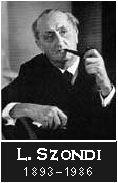













|
||||
 |
 |
|||
|
Szondi's Personality Theory in The Year 2000 (in English). The author Jaakko G. Borg (born 29.VIII.1927) has held appointments as a Senior Lecturer and Docent in Psychology in the University of Tampere, Finland. Some of his qualifications: - Longstanding member of the International Szondi Association - Szondi Award together with Professor R. Hughes - Currently Chairman of the Finnish Szondi Society. Summary: Up to the year 2000 the validity and viability of the Szondi test has not been elicited in precise numerical terms, with the result that it has been generally abandoned except within the school itself. In this his latest book the author shows this situation to be a consequence of the excessively qualitative mode of scoring Szondi used, this involving a fateful loss of information. In this book the 'classic' scoring system is replaced by a new, more predominantly quantitative approach. In experiments with identical twins (62 pairs) the author succeeded in establishing validity values for the Szondi test with his modernised scoring system. In defining differences and similarities in personality, attributable to genetic factors, the validity coefficient of Szondi´s test is on a par with that of the best projective tests, about r = .50. The test may thus well be re-adopted on a wider basis, and is indeed more than welcome, since no other approach is capable of achieving this level in assessing human personality traits of genetic provenance. As such it can be used to give answers to questions concerning differential diagnostic problems.
In the light of these new findings, Szondi´s genetic theory of personality is incontestably worthy of serious attention, also by merit of a number of innovative adjustments the present author proposes.
TABLE OF CONTENTS: 1. Re-emergence of fate analysis 1.1. Background 1.2. LEOPOLD (LIPOT) SZONDI 1893 - 1986 1.3. What more is there to be said? 2. The bases of drive theory 2.1. Background 2.2. The contents of Szondi's theory 2.3. Other theories of tropism. Darwinism, sociobiology, genetic similarity theory - GST 2.4. How is it possible that harmful, defective genes survive as persistently as healthy? 3. Szondi's theory of drives 3.1. The polygenic, multifactorial model 3.2. Drive criteria I, II and III 3.3. Transition to the system principle 3.4. Drive criteria IV, V and VI 4. From Drive Theory to Personality Theory 4.1. Representation of the drives 4.2. The sexual drive: S 4.3. The paroxysmal drive 4.4. The ego drive 4.5. The contact drive 4.6. Divergencies in Freud's and Szondi's drive theories 4.7. Centrifugality and centripetality in Szondi's drive factors 5. Szondi's drive-emotion theory 5.1. Eliciting the theory 5.2. Emotions as correlates of the drives 5.3. Szondi's theory of aggression 5.4. Polarity and regulation 5.5. Model for drive-emotion theory 6. Determination of drives by Szondi test: New aspects 6.1. Presentation of test and scoring 6.2. The classification of selective reactions - from classical to modern 6.3. Test run results and calculations 6.4. Main test quantities and their interpretation 7. Complement profile - der Hintergänger 7.1. Background 7.2. Construction and computation of the complement profile 7.3. Switch of Vorder- and Hintergänger 8. Global test measurements; sexual and social indices 8.1. Conceptualisation of bisexuality 8.2. Determination of the sexual index 8.3. The validity of sexual index and Szondi test 8.4. The social index; its basis 8.5. Determination of the social index 8.6. Validity of the social index 8.7. Norms of sexual and social indices 9. The overall validity of the Szondi test 9.1. Determination of validity by drive scheme analysis 9.2. Szondi research - a regeneration 10. Rules in test interpretation 10.1. Compilation of interpretative components and indicators 10.2. Construction of an overall portrait of test subject I from Sz test results Appendix 1a. Profiles of Test subject I. Classical mode of scoring Appendix 1b. Test records taken in classical format Appendix 2. Interpretative indications for vector patterns (16) in the four drives Jaakko Gabriel Borg: SZONDI'S PERSONALITY THEORY IN THE YEAR 2000. Some experimental specifications. Book I. ISBN: 952-5452-49-2 (in paperback) Price: 250 Fmk (42 euro), 244 pages. Publisher: MC-Pilot Oy/kustannus Väinämöisenkatu 11-13, Tampere/Finland. Author's address: Jaakko G. Borg, Kivirannantie 15. FIN-36640 Iltasmäki FINLAND. |
 |
 |
© 1996-2002 Leo Berlips, JP Berlips & Jens Berlips, Slavick Shibayev


